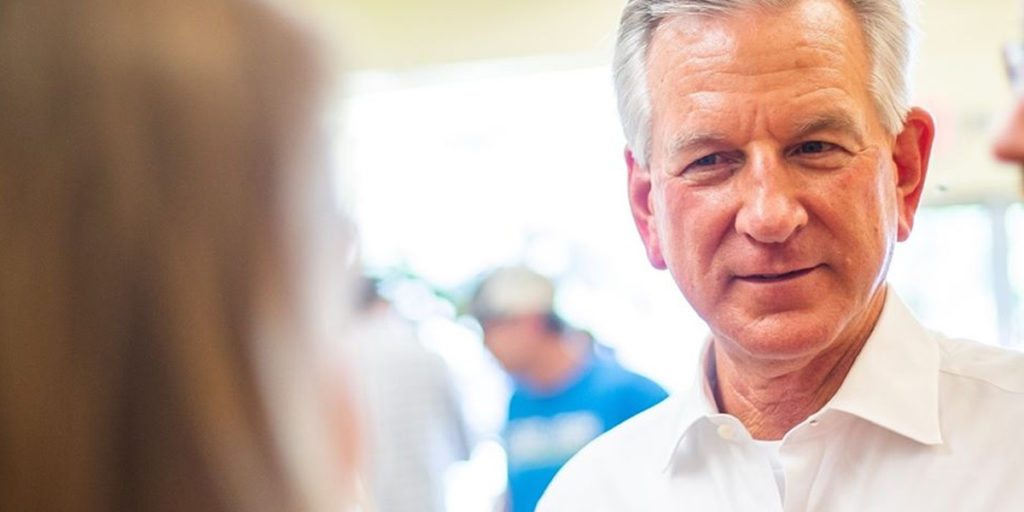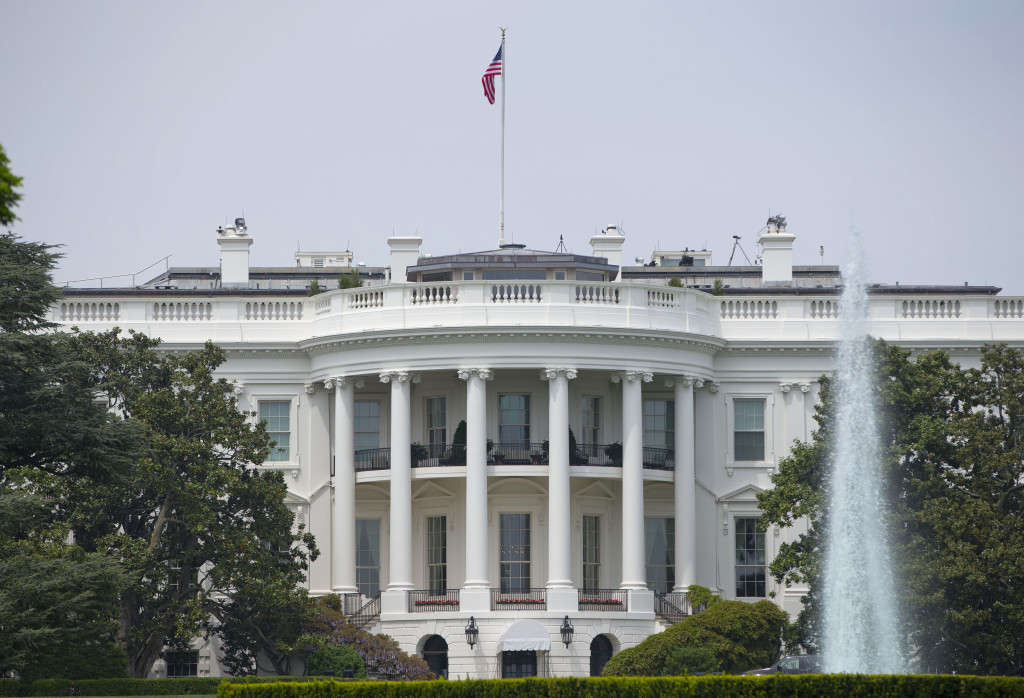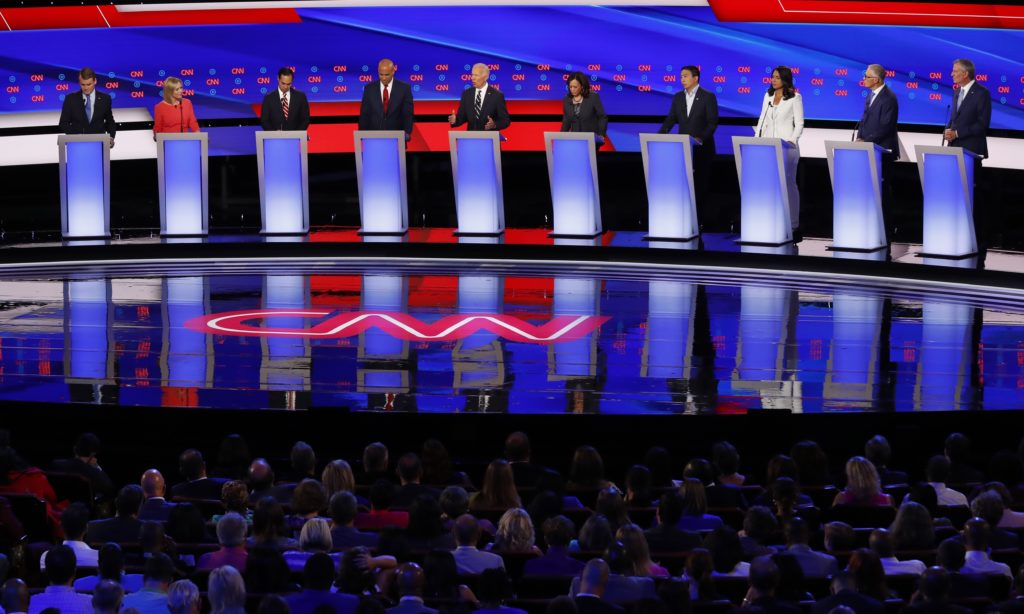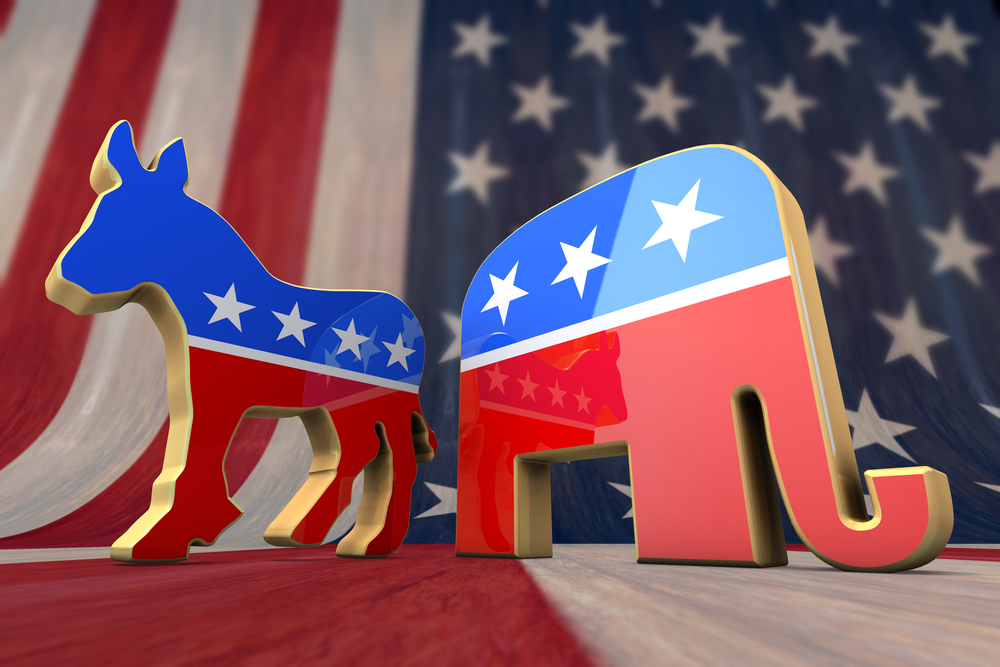Tommy Tuberville asserts ‘God sent us Donald Trump’ in first statewide radio ad

Former Auburn University football coach and Republican U.S. Senate candidate Tommy Tuberville on Monday debuted his campaign’s first statewide radio ad Currently airing on stations across Alabama, the ad endeavors to inform voters about Tuberville’s support for President Donald Trump, his fight against career politicians, and the deeply-held conservative principles that guide both his life and his campaign. “Speaking directly to the voters about the issues that motivate us is the core of our strategy, and the media campaign we kick off today will help us accomplish that goal,” Tuberville said. “It is time for our state to send a political outsider to the U.S. Senate so we can stand with President Trump and give Washington, D.C. a good dose of our conservative Alabama values.” Tuberville faces former U.S. Attorney General Jeff Sessions, U.S. Rep. Bradley Byrne, former Alabama Chief Justice Roy Moore, state Rep. Arnold Mooney, businessman Stanley Adair and Ruth Page Nelson in the crowded Republican primary on March 3, 2020. Listen to the ad below: A transcript of the ad: Announcer: Two-time SEC Coach of the Year. Christian family man. Conservative outsider ready to take on politically-correct liberal politicians. Tommy Tuberville is the Trump conservative. Here’s Coach Tuberville. Tommy Tuberville: I’m not a career politician. I’m really a politician’s worst nightmare. I’ve coached for the last 30 to 40 years. I’ve been around young people, and I believe if we don’t get God back in our schools, this country has got no chance of surviving. I’m a Christian conservative Republican. I believe in the sanctity of life, and I say it with all of my heart “God sent us Donald Trump” because God knew we were in trouble. Announcer: A man of faith. A Republican with strong moral values. Tommy Tuberville is the Trump conservative. Tommy Tuberville: I’m going to stand with President Donald Trump on building the wall and cracking down on illegal immigration. A vote for me is a vote for Donald Trump. I’m not looking for a career. I’m looking to help save this country with Donald J. Trump. I’m Tommy Tuberville, and I approve this message. Announcer: Paid for by Tuberville for Senate Inc.
John Giles: National frustrations hit high water mark

When I was first officially assigned a role in the public sector, Governor Guy Hunt appointed me in 1989, as Alabama State Small Business Advocate. I wasthirty-five years old, a team player, easy to work with, friendly to everyone ingovernment and the private sector, yet mission oriented to advance the cause ofthe Hunt Administration. I can remember having a much greater capacity backthen to take on more water, metaphorically speaking dealing with the slowbureaucracies, political non-sense and the inability to advance the ball down thefield. Just thirty years later, I find my capacity for this non-sense has shrunk, myflash point greatly lowered, and joining America’s escalating frustration. Wehave hit our high-water mark with the dramatic scenes being played out in DCand on the 2020 Democrat Presidential campaign trail. The “swamp,” as Donald Trump calls it, has existed all these years, but now has hit theexponential curve at the state and national level. I used to think my cultivateddiplomatic skills would allow me weave and navigate my way around thelandmines of obstruction for progress, and to some degree it worked. Lookingback on those days, I can clearly see now, if you had a total of ten moves in aday, eight of them were stroking egos, extinguishing little fires, petting theoffended and only two moves in the day was advancing the positive cause ofpromoting economic, social, moral and constitutional governing. If one spent alifetime in this public sector environment with pure motives, you should knowup front, you will only accomplish 20 percent of your capacity, or you will flame outearly. If you understand going in the rules of engagement will greatly hinderadvancing a conservative cause, the tactics of the southern gentleman diplomat,who wants everyone to like them because of their selfish desire of futureadvancement politically, will be guaranteed few earned scored points for thebetterment of mankind at the end of each day. Trump’s sense of urgency, lack of bedside manners, brassy, sometimes rudenessand New York style street fighting tendencies offends the southern gentlemanapproach to governing, but the fierce, out of control, violent, win at all cost andmaligning modern day Democrat behavioral style, can only be put in checkmate with one thing…a 2 x 4 brought to the fight. Unfortunately, the rules of publicdiscourse being changed by Democrats over the years, particularly since theNovember 2016 election, requires one to step in the ring swinging in order toadvance the will of the American people. But Giles, what about Christianity,and Christian principles; sure let’s discuss this point for a moment. Let us remember, Jesus physically cleared the decks in the synagogue of thegreedy merchants personally profiting in the sacred house. Jesus also had anoffensive tongue using words like, brood of vipers, serpents, foolish ones, blind(figuratively not literally), liars and he also called his adversaries hypocrites, justto list off a few. Trump is certainly no saint and definitely not the messiah, butdo we see some current modern day similarities. Jesus was falsely accused ofblasphemy; they held a kangaroo court and then executed him. In the 2016 election cycle, pollsters were trying to brute force a win for Hillaryover Trump. Late at night, on November 8, 2016, Democrats were wailing andgnashing their teeth at the Clinton Victory Party. Where was Hillary…pitchinga hissy fit and did not even show up. Trump well exceeded the ElectoralCollege threshold of 270 with 304 earned votes. Then they tried to override theconstitution bending the narrative around a popular vote. After theinauguration, the Washington Riot Style March filled the streets with womenwearing female genital hats. Immediately, the tone of impeachment echoedamong Democrats and the liberal media. They cranked up a fairy tale story ofRussian collusion, when Hillary was the one colluding with Russians. Comey,rogue FBI cops and some of his treasonist intelligence community colleagueslaid out a Trojan horse strategy for Trump’s removal, fueled by a false dossierpaid for by Clinton, DNC and Soros. Two years and forty five million UStaxpayer dollars later, the Mueller Report was a Big Zero. Then, the falseBrett Kavanaugh confirmation hearing fiction played out as choreographed and theywere caught again. Now we have an unidentified whistle-blower, launching animpeachment through surrogate hearsay, presumptions, and false testimonies,when all they had to do is read the conversation transcript. It might havehelped for them to watch the Ukrainian President on TV categorically deny anypressures of quid quo pro by Trump. If I was reading a novel and not living thisreal time, I would be thinking in these terms: brood of vipers, serpents, foolish ones, blind (figuratively not literally), certified liars and hypocrites. Soundfamiliar? For a minute let me rewind to the 2016 election cycle. Americans had hit theirhigh water mark on political correctness, watching Obama split the countryinstead of being the healer he promised. Remember “CHANGE,” we got italright. The DOJ, under Eric Holder became the largest Civil Rights law firm inthe country going after cops rather than criminals. Obama’s “Green Jobs”economic development plan turned into closed windmill plants and millions ofwasted grant dollars. Globetrotting on expensive golf vacations and apologizingto the world that somehow America was guilty of some abusive behavior.Obama had strategically weakened our military to an all-time low. The finalresults of this eighth year behavior, Trump and the deplorables dumped theObama-Clinton machine. Now let’s fast forward to the 2020 elections. You would think they would learnfrom 2016, but some folks tend to walk back through the same yard where thedog bit them last time. America is experiencing historic low employment, jobcreation, capital investment, stock market is unprecedentedly soaring, worldnow respects us, balancing the trade defects, rebuilding the military, taking careof our veterans, reining in illegal immigration, building the wall, respecting andsupporting law enforcement officers, appointing constitution originalist to thefederal bench, sticking to the list of twenty three for the U.S. Supreme Courtvacancies, moving the U.S. Embassy for Israel to Jerusalem, opening updomestic oil production and leading globally in oil exports, stepping up NATOpartners investment in protecting Europe, pulling out of the fake science drivenParis Climate Accord, renegotiating NAFTA and GATT for a new balancedtrade relations between Mexico and Canada,
10 democrats set for next debate as several others miss cut

Struggling Democratic presidential candidates are facing the bad news that they are not among the 10 who have qualified for the next debate, a predicament that is likely to spell doom for their campaigns. Hours ahead of a midnight Wednesday deadline to qualify, New York Sen. Kirsten Gillibrand announced she was dropping out of the race after spending at least $4 million on advertising in recent months to qualify. Billionaire climate change activist Tom Steyer, Montana Gov. Steve Bullock and self-help guru Marianne Williamson were also among those missing September’s debate, as were Colorado Sen. Michael Bennet, Hawaii Rep. Tulsi Gabbard and a handful of others. To appear on stage in Houston next month, they had to hit 2 percent in at least four approved public opinion polls while securing 130,000 unique donors . Two new polls released Wednesday affirmed that they were all below the threshold. The question shifted from who would qualify for the following debate to who would stay in the race. “Our rules have ended up less inclusive … than even the Republicans,” Bullock said on MSNBC, referring to the thresholds set by the Democratic National Committee. “It is what it is.” The 10 candidates who qualified for September’s debate are Joe Biden, Cory Booker, Pete Buttigieg, Julián Castro, Kamala Harris, Amy Klobuchar, Beto O’Rourke, Bernie Sanders, Elizabeth Warren and Andrew Yang. In a still-crowded Democratic field, not qualifying for the debate was expected to severely cripple a candidate’s prospects. However, several have pledged to forge on in hopes of reaching the requirements in time for the next debate, in October. Although earlier debates had lower thresholds, the DNC raised the stakes for the fall debates. “We believe you need to show progress in your campaign,” said Democratic Party spokeswoman Xochitl Hinojosa. “There hasn’t been one candidate in 40 years who has polled under 2% the fall ahead of a primary and has gone on to be the Democratic nominee.” The DNC designed the requirements to bring order to an unwieldy field of more than 20 White House hopefuls, while elevating the role of online grassroots donors who are among the party’s most fervent supporters. In some ways, the party has succeeded. But the process has drawn complaints from those unlikely to make the cut. They argue that the rules are arbitrary and have forced candidates to pour money into expensive online fundraising operations that can sometimes charge as much as $90 for every dollar raised. Bennet said the threshold favored Steyer, and a memo by his campaign accused the billionaire of trying to buy his way into the debate. “Other candidates have had to spend millions to acquire donors on Facebook, instead (of) communicating with voters and laying the groundwork to beat” President Donald Trump, the Bennet campaign memo stated. Steyer, a late entry in the race, was the closest to qualifying but acknowledged Wednesday night that he too had fallen short. “While I’m disappointed that I won’t be on the debate stage in Houston this month, I’m excited by all the support you’ve shown us,” he tweeted to supporters. “We started this campaign to get corporate influence out of politics, and I won’t stop fighting until the government belongs to the people again.” In a separate letter to Democratic Party Chairman Tom Perez, Bennet’s campaign asked how the DNC decided which polls to allow and questioned why Democrats were trying to narrow the field months before Iowa caucuses. Yet Hinojosa, the DNC spokeswoman, said those who are upset have had ample time to build support and reach the thresholds. Instead, most have consistently polled at 1% or below. “We are asking Democratic candidates to hit 2 percent in four polls. That is not a high threshold,” said Hinojosa, who added the DNC is accepting the results from 21 polls. Steyer and Gillibrand both poured millions of dollars into Facebook and TV ads to boost their standing in recent months. While Steyer met the donor threshold, he was one poll shy. Gillibrand was three polls away and had yet to lock in enough donors. Gabbard was two polls away from qualifying, and Williamson was three polls away.Several others who struggled had already chosen to drop out. Washington Gov. Jay Inslee, Massachusetts Rep. Seth Moulton and former Colorado Gov. John Hickenlooper all recently ended their campaigns. With no more than 10 participants, the September debate would be the first of the cycle held on a single night. Earlier debates featured 20 candidates split across two nights.Biden, the race’s early front-runner, said he would like the field to winnow even further. “I’m looking forward to getting to the place, assuming I’m still around, that it gets down to a smaller number of people so we can have more of a discussion instead of one-minute assertions,” the former vice president said Wednesday while campaigning in Spartanburg, South Carolina. By Brian Slodysko Associated Press Associated Press writer Bill Barrow in Spartanburg, South Carolina, contributed to this report. Republished with the permission of the Associated Press.
Vexed with minority status and rancor, GOP lawmakers retire

The House’s only black Republican has become the latest GOP lawmaker to say he won’t seek reelection next year, jolting the party’s efforts to appeal to minority voters and wounding its already uphill chances of regaining House control. Rep. Will Hurd, a moderate Texan who’s clashed with President Donald Trump over race and immigration, used an evening tweet to announce he would not seek re-election next year. That made him the ninth House Republican to say they will depart — the sixth in just over a week — and gives Democrats a strong shot to capture a district that borders Mexico and has a majority Hispanic population. Hurd’s exit put the GOP ahead of its pace when 34 of its members stepped aside before the last elections — the party’s biggest total since at least 1930. It also underscored how Republicans are struggling to cope with life as the House minority party, today’s razor-sharp partisanship and Trump’s tantrums and tweets. Republicans say they don’t expect this election’s retirements to reach last year’s levels.But their more ominous problem is embodied by Hurd, one of several junior lawmakers to abruptly abandon vulnerable seats and a visible symbol of the GOP’s attempt to shed its image as a bastion for white males. The recent spate of departures puts perhaps four GOP seats in play for 2020 and suggests an underlying unease within the party about the hard realities of remaining in Congress. “There’s a mood of tremendous frustration with the lack of accomplishment,” Rep. Paul Mitchell, Republican-Michigan, said in an interview this week, days after stunning colleagues when he said he’s leaving after just two House terms. “Why run around like a crazy man when the best you can hope is maybe you’ll see some change at the margins?” Mitchell, 62, who said he originally intended to serve longer, blamed leaders of both parties for using the nation’s problems “as a means to message for elections” instead of solving them. He also expressed frustration with Trump’s tweets last month telling four Democratic congresswomen of color — including his Michigan colleague, Rep. Rashida Tlaib — to “go back” to their home countries, though all are American. The tweet was “below the behavior of leadership that will lead this country to a better place,” Mitchell said. In a statement, Hurd did not mention Trump but pointedly said he’d held onto his seat “when the political environment was overwhelmingly against my party.” The former CIA operative said he was pursuing opportunities in technology and national security. Hurd, 41, was a leader in a failed bipartisan effort last year, opposed by Trump, to help young immigrants brought to the U.S. illegally stay in this country. He was also among just four Republicans to last month back a Democratic condemnation of Trump’s “go back” insult as racist. Just a day earlier, Rep. Michael Conaway, Republican-Texas, also said he won’t seek reelection, which he attributed to his loss of a leadership role atop his beloved House Agriculture Committee. Conaway, 71, represents a central Texas district that is safe Republican territory. Republicans say it can be demoralizing to be in the minority in the House, where the chamber’s rules give the majority party almost unfettered control. That leaves them with little ability to accomplish much, even as they must continue the constant fundraising that consumes many lawmakers’ hours. “When you’ve been in the majority, it’s no fun to be in the minority,” said veteran Rep. Tom Cole, Republican-Oklahoma. But other Republicans in the Capitol and outside it — several speaking on condition of anonymity to avoid alienating colleagues — say the frustration runs deeper. They describe worries that they won’t win back the majority in 2020, which would mean two more years of legislative futility, and exasperation over Trump’s outbursts, including his racist tweets taunting the four Democratic women. “The White House isn’t helping the atmosphere up to this point for these guys. They’re having to answer every day for things they didn’t say or do,” said former Rep. Tom Davis, Republican-Virginia. “That’s not a good place to be.” Michael McAdams, a spokesman for the National Republican Congressional Committee, said the retirements are “what happens this time of year.” He said Republicans are “in a prime position to pick up seats and recapture the majority.” In another blow to the GOP’s reach for diversity, it is losing two of the mere 13 House Republicans who are women. Rep. Martha Roby of Alabama , 43, like Michigan’s Mitchell, is vacating a deeply red seat, while the retirement of Susan Brooks, 58, could put her Indiana seat at risk. Reps. Rob Woodall of Georgia, 49, and Pete Olson of Texas, 56, would have faced difficult races had they run for reelection. Their departures are unhelpful for a party that must gain at least 18 seats to win the majority. In next year’s House contest, history favors Democrats, who have a 235-197 majority with two vacancies and one independent. The last time a president ran for reelection and any party gained at least 18 House seats — the minimum Republicans need to take over — was 1964, when President Lyndon Johnson’s landslide netted Democrats a 37-seat pickup. Party control of the chamber hasn’t changed during a presidential election since 1952, when Republican Dwight Eisenhower won the White House and majority Democrats lost the House. On the practical side, the House’s 62 freshmen Democrats and the party’s other vulnerable lawmakers have energetically raised money for their reelection campaigns. Even first-termers in GOP-friendly districts in Oklahoma City, Salt Lake City and Charleston, South Carolina, have banked significant early funds. The GOP’s rules for seniority are also a factor. Texas’ Conaway and fellow retiree Rep. Rob Bishop, Republican-Utah, will both exhaust the self-imposed six-year limit the House GOP allows for lawmakers to chair a committee or serve as its top Republican. Bishop, 68, will be ending his run atop the Natural Resources Committee. Another retiring Republican, Alabama Rep. Bradley Byrne, 64, is running for Senate
Freshmen house democrats raise more money than gop opponents

The Republican pathway for recapturing House control in next year’s election charges straight through the districts of the most vulnerable Democratic incumbents, especially freshmen. Judging from early but formidable cash advantages those lawmakers have amassed, ousting them won’t be easy. Each of the 62 freshmen House Democrats has raised more money than their top opponent. The same is true for all 31 Democrats from districts President Donald Trump had won in 2016 and for all 39 Democrats who snatched Republican-held seats last November. In nearly all cases it’s not even close. While there’s overlap among the categories, most of these Democrats’ war chests are multiples of what their leading challengers have garnered. That’s testament to the historic ability of both parties’ incumbents to attract contributions and Democrats’ strategy of aggressively collecting money quickly to seize on the anti-Trump enthusiasm that fueled their House takeover last year . “The more you can raise early on, the more you’re going to be able to solidify your seat and show that it’s not worth investments on behalf of Republicans” by GOP donors, said freshman Rep. Katie Hill, Democrat-California. Hill has raised $1.3 million so far this year, more than triple the combined contributions reported by her four would-be Republican challengers. She was elected last year in a Southern California district Republicans had held since 1993. Democrats control the House 235-197, with one independent and two vacancies. Republicans will need 218 seats for a majority. Democrats’ money advantages reflect reports filed with the Federal Election Commission covering the first half of 2019, so plenty can change by Election Day. Many serious challengers haven’t commenced their campaigns yet or have only recently started raising money, and many Republicans will eventually overtake their Democratic rivals. In addition, by November 2020 many GOP candidates will be bolstered by the Republican Party’s allied super PACs, political action committees that can spend unlimited funds. The Congressional Leadership Fund, the GOP super PAC that helps House candidates, unleashed $159 million in 2018 races, well above the $96 million by Democrats’ House Majority Fund. “We haven’t seen anything yet. Wait till the super PACs start dropping their bombs later in the cycle,” warned former New York Rep. Steve Israel, who once led the Democratic Congressional Campaign Committee, or DCCC, House Democrats’ election organization. Republicans downplay the early money discrepancies but concede the numbers merit attention. “It’s a wake-up call to every Republican that you’ve got to be out there doing the work, making sure we beat the trend of money coming in” to Democrats, said Rep. Rodney Davis, Republican-Illonios. Davis is a top Democratic target who was re-elected by less than 1 percentage point last November and faces a 2020 rematch against the well-financed Betsy Londrigan. Even so, warning signs for the GOP are scattered around the country. Democratic freshman Rep. Joe Cunningham, who squeaked into office in South Carolina’s Trump-leaning Lowcountry coastal district, has raised nearly $1.3 million. That’s more than quadruple his best-funded GOP opponent and double the top three Republicans’ contributions combined. Also outstripping their top money-raising GOP challengers are five freshmen from districts Trump carried by a comfortable 10 percentage points or more: Reps. Jared Golden of Maine, Kendra Horn of Oklahoma, Xochitl Torres Small of New Mexico and Anthony Brindisi and Max Rose of New York. Freshman Rep. Tom Malinowski, Democrat-New Jersey, who defeated a GOP incumbent in November, has doubled the fundraising of Tom Kean Jr., a prized GOP recruit and son of a popular former governor by the same name. Sixteen freshmen Democrats ousted Republicans last year by a narrow 4 percentage points or less, and all but two of them have raised at least twice as much as their nearest GOP rival: Reps. Gil Cisneros of Southern California and Oklahoma’s Horn. Underscoring Democrats’ efforts to shore up vulnerable incumbents, 26 of the 62 Democratic freshmen have already raised $1 million or more. They’re led by the nearly $2 million accumulated by the party’s highest-profile newcomer, progressive Rep. Alexandria Ocasio-Cortez , who has a safe New York City seat but seems likely to use some money to help others. Also exceeding $1 million in receipts are 13 of the 31 Democrats who captured Trump-won districts, and 23 of the 39 Democrats who grabbed GOP seats. One of those flush Democrats is freshman Rep. Josh Harder of California’s Central Valley. He’s raised more than $1.6 million, tripling his best-financed GOP challenger, Ted Howze, a large-animal veterinarian who ran unsuccessfully last year. “We don’t have to raise as much as him, but just enough to get our message out,” said Howze. He said he could need up to $6 million for his campaign. Harder spent more than $8 million to win in 2018. The DCCC should further shore up Democrats. It disbursed $297 million helping candidates for 2018, exceeding the $201 million spent by its counterpart, the National Republican Congressional Committee. It’s ahead in this year’s money race as well. In some areas, Republicans are already exhibiting fundraising chops. Don Sedgwick, mayor of Laguna Hills, California, has raised an impressive $621,000, but that’s a fraction of the $1.4 million collected by his intended target, freshman Democratic Rep. Katie Porter. Republican Young Kim, whom Cisneros narrowly defeated in 2018, is not far behind the $579,000 Cisneros has raised. And while freshman Rep. Lucy McBath, Democrat-Georgia, has raised nearly $1.2 million, the top four GOP contenders have raised $1.5 million combined. That suggests plenty of money may be available for the eventual Republican nominee. By Alan Fram Associated Press. Republished with permission of the Associated Press.
Cory Booker launches 2020 bid

U.S. Sen. Cory Booker on Friday declared his bid for the presidency in 2020 with a sweeping call to unite a deeply polarized nation around a “common purpose.” The New Jersey Democrat, who is the second black candidate in a primary field that’s already historically diverse, delivered his message of unity amid an era marked by bitter political division. He announced his run on the first day of Black History Month, underscoring his consequential status as America’s potential second black president after Barack Obama. “I believe that we can build a country where no one is forgotten, no one is left behind; where parents can put food on the table; where there are good-paying jobs with good benefits in every neighborhood; where our criminal justice system keeps us safe, instead of shuffling more children into cages and coffins; where we see the faces of our leaders on television and feel pride, not shame,” Booker said in a video message to supporters, subtly jabbing at President Donald Trump. “It is not a matter of can we, it’s a matter of do we have the collective will, the American will?” he added. “I believe we do.” Booker enters what’s shaping up to be a crowded presidential primary, with three of his fellow Democratic senators — Elizabeth Warren of Massachusetts, Kamala Harris of California and Kirsten Gillibrand of New York — already either declared or exploring a run. But he’s spent months telegraphing his intentions to join the race, visiting the early-voting states of Iowa, New Hampshire and South Carolina to build connections with key powerbrokers. He already has slated trips back to those states later this month. Booker began reaching out to key constituencies Friday, calling in to three radio shows popular with black and Hispanic listeners. He spoke in fluent Spanish during his interview with Univision, vowing to work closely with “the Latino community,” and discussed his support for marijuana legalization in another interview. Later on Friday, Booker will be a guest on “The View,” a TV talk show popular with female viewers, where his mother plans to sit in the audience. A former mayor of Newark, New Jersey’s largest city, Booker won a special Senate election in 2013 to replace Democrat Frank Lautenberg and then won a full Senate term in 2014. He will be able to run for a second full Senate term in 2020 while running for president, thanks to a law that New Jersey’s governor signed in November. But that doesn’t mean the 49-year-old’s path to the nomination will be easy. As many as five more Democratic senators could soon mount their own primary bids, creating a competition for voters’ attention, and several of Booker’s rival presidential hopefuls bring higher name recognition to a race that may also feature popular former Vice President Joe Biden. The affable Booker, known for his fluency in connecting with voters during an age of selfies and social media, also could face some difficulty winning the hearts of the Democratic base due to his past financial ties to banking and pharmaceutical interests. Booker said he would stop taking contributions from pharmaceutical companies in 2017, the year that he partnered with potential presidential rival Sen. Bernie Sanders of Vermont on a bill that would allow importation of prescription drugs from Canada. He also likely will stand alone as an unmarried candidate, though he brings a compelling personal biography that could help elevate his message that “the only way we can make change is when people come together.” Booker’s father grew up in a low-income community in North Carolina, and the senator has recalled his family’s later struggle to settle in suburban New Jersey amid discrimination against black homebuyers. The senator has brought a heartfelt and passionate style to his achievements in the Senate, at times fusing his personal spirituality with policy proposals that focus on social justice. Booker played a key role in the bipartisan criminal justice reform bill that Trump supported last year, for example, helping strike that deal two months after sparring with Republicans during the battle over Supreme Court Justice Brett Kavanaugh’s confirmation. In his announcement video, Booker invoked the fight against slavery and the role of immigration in building the nation’s character. “The history of our nation is defined by collective action; by interwoven destinies of slaves and abolitionists; of those born here and those who chose America as home; of those who took up arms to defend our country and those who linked arms to challenge and change it,” he said. Born in the nation’s capital but raised in New Jersey, Booker made a name for himself as Newark mayor by personally shoveling the snow of residents. He has $4.1 million left in his campaign coffers that could also be used to assist his presidential run. Rather than opening an exploratory committee to test the waters, Booker took the direct step to open a campaign seeking the Democratic nomination. Booker is aligning with many other prominent Democratic White House contenders by forswearing all donations from corporate political action committees and federal lobbyists to his campaign, dubbed Cory 2020. A prominent Booker supporter, San Francisco attorney Steve Phillips, says he is working on millions of dollars in committed donations to a so-called super PAC that would boost the senator’s candidacy, but Booker’s campaign is openly against super PACs playing any role in the presidential race. Booker visited his local congregation at Metropolitan Baptist Church in Newark on Thursday night for prayers ahead of his Friday announcement, a decision that underscores the role his faith will play in his campaign. He has attended service at the church since moving to Newark in 1996. Booker’s campaign manager will be Addisu Demissie, who managed California Democratic Gov. Gavin Newsom’s campaign last year and previously worked on Hillary Clinton’s 2016 presidential bid. His deputy campaign manager, Jenna Lowenstein, is also a veteran of Clinton’s 2016 campaign, while his current Senate chief of staff, Matt Klapper, will serve as a senior campaign adviser.
2020 Democratic primary field puts diversity in spotlight

The early days of the Democratic primary campaign are highlighting the party’s diversity as it seeks a nominee who can build a coalition to take on President Donald Trump. Of the more than half dozen Democrats who have either moved toward a campaign or declared their candidacy, four are women: Sens. Kirsten Gillibrand of New York, Kamala Harris of California and Elizabeth Warren of Massachusetts and Rep. Tulsi Gabbard of Hawaii. Harris is also African-American. Former Obama Cabinet member Julian Castro, who is Latino, has also joined the race. And on Wednesday, Democrat Pete Buttigieg, the 37-year-old mayor of South Bend, Indiana, jumped into the campaign. If he wins the Democratic nomination, he would be the first openly gay presidential nominee from a major political party. He would also be the youngest person ever to become president if he wins the general election. The diversity is likely to expand in the coming weeks as other Democrats enter the race. The field that’s taking shape follows a successful midterm election in which Democrats elected a historically diverse class of politicians to Congress, a pattern they’d like to repeat on the presidential scale. Neera Tanden, president of the liberal Center for American Progress Action Fund, hailed the Democrats’ multiple trailblazing candidates for reflecting that “the central opposition to Trump is around a vision of the country that’s inclusive of all Americans.” “A lot of different people are going to see that they can be part of the Democratic Party” thanks to a field that showcases women, candidates of color, and the first potential LGBT nominee, Tanden said. The primary “hopefully will bring a lot of people into the process,” she added, recalling the high number of voters who engaged in a 2008 Democratic primary that featured a possible female nominee, Hillary Clinton, and the man who would become the first black president, Barack Obama. The array of backgrounds was on display Wednesday when Buttigieg spoke in personal terms about his marriage. “The most important thing in my life — my marriage to Chasten — is something that exists by the grace of a single vote on the U.S. Supreme Court,” Buttigieg told reporters. “So I’m somebody who understands — whether it’s through that or whether it’s through the fact that I was sent to war on the orders of the president — I understand politics not in terms of who’s up and who’s down or some of the other things that command the most attention on the news but in terms of everyday impacts on our lives.” Gillibrand has put her identity as a mother at the core of her campaign, and Harris launched her campaign on this week’s Martin Luther King holiday, a nod to her historic bid to become the first black woman elected president. A number of high-profile candidates remain on the sidelines, including two who would further bolster the diversity of the 2020 field: Sens. Cory Booker of New Jersey, who is black, and Amy Klobuchar of Minnesota. Booker, who’s widely expected to join the presidential fray in the coming days, visited the pivotal early-voting state of South Carolina this week for public events honoring King and private meetings with local activists. Klobuchar is set to speak at the University of Pennsylvania on Thursday about her work on the Senate Judiciary Committee, where Booker and Harris also are members. The affable Midwesterner recently told MSNBC that her family “is on board” if she opts to run in 2020, though she’s offered little clarity about her timetable to announce a decision. Though Klobuchar would be the fifth major female candidate in the Democratic primary, female candidates shouldn’t be shoehorned into a “narrative” dominated by their identity that excludes the policies they’re championing, said Virginia Kase, CEO of the League of Women Voters. Kase pushed back at one popular 2018 narrative in a recent interview, noting that that “every year is the year of the woman — the reality is that we’ve always been major contributors” in the electoral process. Rashad Robinson, executive director of the civil rights-focused nonprofit Color of Change, said in an interview that the diversity of the Democratic field is “a great thing and we should celebrate it,” adding that, “Our work is always about changing the rules — changing the rules of who can run and who can rule and who can lead is incredibly important.” But in addition to those “unwritten rules,” Robinson pointed to the urgency of changing the “written rules” of American life, adding that “diversity alone does not mean structures and policies and practices that have held so many back will change” overnight. Meanwhile, three white male candidates who could scramble the race — former Vice President Joe Biden, Sen. Bernie Sanders of Vermont, and former Texas Rep. Beto O’Rourke — are still weighing their own presidential plans. Biden addressed a key vulnerability in his potential candidacy this week by publicly airing regret about his support for a 1994 crime bill that’s had particularly negative effects on African-American communities, while Sanders built his own new connections to black voters during a trip to South Carolina. As Biden mulls a run for president, his allies have been sending supporters a memo that could serve as a rationale for a campaign. The memo hails Biden’s long track record in politics and argues that at a time of “unprecedented political chaos” during Trump’s administration, Biden would offer “trustworthy, compassionate leadership.” O’Rourke, for his part, continues to gauge his own future amid pundits’ criticism about blog posts he published during a recent road trip through multiple states. The 46-year-old Texan acknowledged that he’s been “in and out of a funk” following his departure from Congress after losing a high-profile Senate race in November, sparking questions about the luxury of his indecision given the family wealth and network of passionate backers he can lean on. As the Democratic field is poised to become more diverse, Republicans say Trump will run for re-election based on his
Cybersecurity officials start focusing on the 2020 elections

Federal cybersecurity officials aren’t aware of any voting system compromises by Russia or other foreign agents during the midterm elections. But it’s not entirely clear why — or whether hackers are saving their gun powder for the 2020 presidential showdown. Nevertheless, election security officials are already working to prepare for the next big race. During Tuesday’s midterm voting, 45 states came together to report on potential cyber threats along with federal experts who were weighed in on real time. The head of cybersecurity at the Department of Homeland Security, Chris Krebs, says there was an increase this year in reporting of potential cyber incidents. He attributes that to better communication, not an increase in overall threats. In 2016, federal officials were accused of being too tight-lipped.


